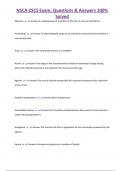Exam (elaborations)
NSCA CSCS Exam; Questions & Answers 100% Solved
- Course
- Institution
NSCA CSCS Exam; Questions & Answers 100% Solved Abrasion Answer-A scraping away of a portion of the skin or mucous membrane Acclimatize Answer-To physiologically adapt to an unfamiliar environment and achieve a new steady state Actin Answer-Thin contractile protein in a myofibril Action An...
[Show more]



